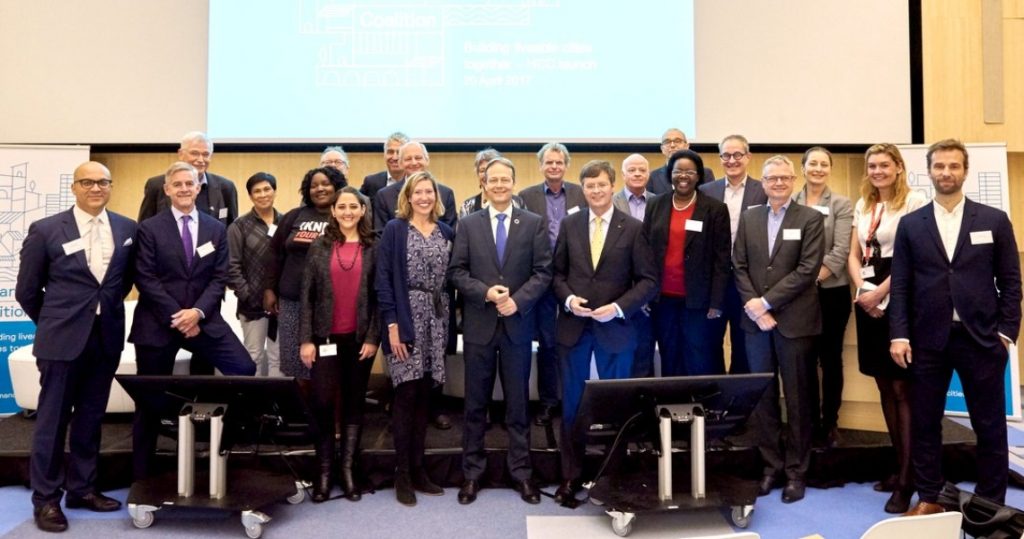Amsterdam, The Netherlands — The challenges are enormous: 70 percent of the world’s population will live in cities by 2050. Even today, slums hold a billion people, but that figure is expected to triple in coming decades. And with cities under mounting pressure to improve infrastructure and resources strained by rapid urbanization, it’s the poor who already are feeling the brunt of bad sanitation, pollution, overcrowding and increased vulnerability to climate change.
Published in: www.cityscope.org // Selma Ziljstra // April 27th, 2017 // Full article here

Against this backdrop, a new effort unveiled here last week will seek to coordinate the private sector around this set of concerns. The Human Cities Coalition (HCC), a smaller iteration of which was founded by Dutch paint and coatings firm AkzoNobel a year and a half ago, publicly launched last Thursday at the company’s Amsterdam headquarters.
The coalition brings together 150 stakeholders and 20 partners in a notably broad public-private collaboration that will seek to find — and finance — new efforts toward sustainable and equitable cities. (The coalition is open to new members.) In particular, the effort will seek to incubate ideas that are scalable and replicable.
Under AkzoNobel, the initiative has been doing preliminary work in Jakarta and Manila, undertaking needs assessments and building coalitions. As the project now expands with new partners, it will continue to work in those cities, with plans to move into other urban areas if those operations are successful.
The HCC is being organized with an eye to a new global goal on sustainable cities, Sustainable Development Goal 11, part of a U. N. framework that came into effect last year. “SDG 11 is often translated into ‘smart’ cities, ‘resilient’ cities or ‘transparent’ cities. But HCC wants to make them ‘human,’” said Ton Büchner, chief executive of AkzoNobel.
[See: SDG 11: The ‘urban’ sustainable development goal]
How do they plan to do so? Collective innovation will be key, Büchner suggested. “We have 4,000 scientists,” he said, referring to AkzoNobel. “But together with our partners and academia, we can make it 100,000. In that way, we create a snowball that becomes bigger and bigger as it goes.”
In addition to this focus on scalable solutions over project-by-project applications, HCC aims to distinguish itself by involving the private sector from the start. The coalition’s leadership wants the group to bridge the needs of local communities with the knowhow and financial resources of the private sector. Slum dwellers are equal partners in the coalition, and it is their priorities upon which any interventions will be based, organizers say.
Sheela Patel, who chairs Slum/Shack Dwellers International (SDI), said the coalition is unique precisely in that inclusivity. “We are a partner in a process where otherwise we would be a beneficiary,” she said at the launch, in a video message from Delhi.
Others say they hope the approach can push back on the top-down interventions that typically take place in informal settlements.
HCC organizers say local communities will be considered a partner at all points in the process — identifying their own needs, doing their own data collection, and deciding on the HCC’s interventions and even playing a core role in subsequent operations.
“Our priorities are water, sanitation and tenure security,” said Ofelia Bagotlo, a slum federation leader in Manila. “Until now, the government never consults us. We are getting evicted from our homes, as if there’s no place in the city for us … There has been a lot of talking about solving our issues — I hope this time words will come into action.”
Enticing the private sector
As a development approach, of course, community consultations are not unique. But HCC’s backers hope to differentiate the new initiative by matching local interests with those of the private sector, as well as with government plans already in place.
One of the coalition’s main goals is to engage a mix of public and private financing (known as “blended” finance) in ways that can measurably reduce urban poverty, stimulate local economies, respond to urban infrastructure and affordable-housing gaps, and build the resilience of vulnerable communities to climate change.
HCC organizers recognize that these are weighty goals but note that there are broad sectors in which the private sector has not yet been fully engaged. They say the coalition will seek to fill a gap in areas where neither the public nor private sectors have been able to keep up with urban demand.
“Urban development and the provision of basic services are a public responsibility, but the delivery of these goods can be private,” explained Fleur Henderson, who coordinates the HCCtogether with Ronald Lenz. “Public institutions, including multilateral development organizations, do not have the means to finance public goods themselves, while private parties cannot carry the risks alone.”


